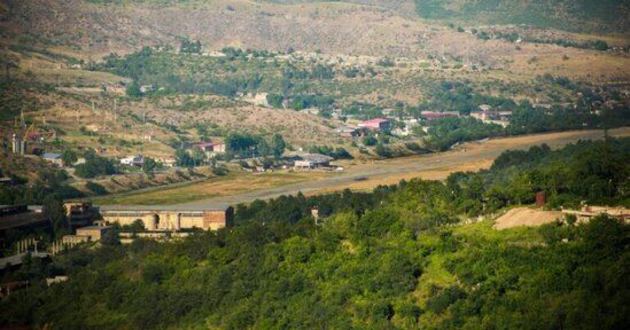With the exception of tragedy, trains rarely stir the international media. But when a new rail-line could hand one of America’s greatest threats renewed clout in a region currently closed to it, that should change. Particularly when that country has a new hardline leadership on the cusp of power. As The National Interest writes, formerly a hanging judge, Iranian president-elect Ebrahim Raisi will be the least trustworthy of his recent predecessors. More ruthless and zealous in his revolutionary Islamist conviction, the distinguishing feature of his career was his role in a “death commission” that oversaw the secret executions of 30,000 thousand political prisoners in 1988. But though struggling under the weight of sanctions and isolation, Iran and its new leadership may soon be thrown a lifeline in the South Caucasus. Perhaps bizarrely, Armenia may inadvertently cast it to them. With renewed influence with Yerevan, America must prevent this at all costs.
Some geographical and historical context is necessary. Last autumn, Azerbaijan and Armenia fought a conflict over a region called Nagorno-Karabakh. The result was a return of internationally recognized lands to Azerbaijan that had been occupied since the two nations went to war as the USSR collapsed. Another consequence of their ceasefire agreement was the re-opening of transit routes between and within one another’s countries.
This is of grave importance to both Armenia and Azerbaijan. For Yerevan, its thirty-year occupation had left it isolated and reliant on Russia, with neighboring Azerbaijani Turkish borders closed to it. For Baku, it means the reopening of a transit line that runs twenty-six miles across Armenia’s southern border with Iran, reconnecting Azerbaijan with its long-isolated exclave Nakhchivan. However, Armenia’s Prime Minister Nikol Pashinyan—until recently in the midst of a post-conflict crisis election—has said he will never entertain the idea of the Nakhchivan corridor, in spite of its explicit mention in the ceasefire agreement.
Few realize there could be an alternate rail line south of the border, through Iran, that mirrors the one envisaged in the ceasefire agreement. This would weaken Armenia’s hand in post-conflict negotiations; it should be cause to exercise caution.
Re-establishing direct connection is of great symbolic importance to Azerbaijanis, and therefore figures highly in any geostrategic calculation. Traveling to or from Nakhchivan currently entails a lengthy circumvention through Iran on poor roads—or freighting through Georgia and Turkey to the enclave. Up until now, the most logical line was to run it where it once was; and was assumed possible with the resolution of the Armenian-Azerbaijani dispute.
But this calculation is changing due to Armenia’s intransigence. Within some circles in Baku, it is leading to consideration of this alternate Iranian route. Not only would this cut Armenia out of the future regional economy but it would hand Tehran renewed influence where it had recently been lacking.
Last autumn’s conflict blindsided Iran’s leadership in a region it believes is part of its domain. Russia and Turkey, allied respectively to Armenia and Azerbaijan, emerged as the key external power brokers. Tehran, waking up, has been touring the region post-war to re-establish its presence. The rail line will be that fix.
Regional connectivity, long stymied by the dispute, is the key to prosperity in the South Caucasus. Handing a critical role within that infrastructure to a malign actor to obstruct at will—or at least threaten to—delivers them undue leverage. For a regime known to move against rational economic incentives, this bodes ill. But if it is Azerbaijan’s only feasible option, Baku will take it.
Then there are the wider ramifications. The South Caucasus sits along the so-called middle corridor for freight between the Asia-Pacific and Europe. Infrastructure on both sides of the continents is ready to be connected. The final Azerbaijan-Nakhchivan jigsaw piece, whether it runs through Armenia or Iran, would form the fastest link. Were it to run through Iran, it hands Tehran still yet more leverage and integration into the global economy.
That is why America must impress upon Armenia to step up—for its own economic future and regional security. After being initially side-lined in the conflict’s resolution, Washington has recently managed to broker the first diplomatic breakthrough since the cessation of hostilities: Azerbaijan released fifteen Armenian detainees and, in return, Yerevan handed over maps detailing mines it had laid in one of the seven districts Azerbaijan reclaimed during the conflict.
In theory, Pashinyan shouldn’t take too much convincing: the corridor is after all in Armenia’s interest. Despite losing the conflict, he has touted the links now possible as a transformational opportunity. Hopefully, his previous denial of the Nakhchivan corridor was to mitigate against electoral attacks from an opposition crying traitor. With his election victory secured, he now has a mandate to make perceived concessions for Armenia’s future good.
Still, with the specter of Iranian influence possible through potential miscalculation, Washington would do well to remind him why the Nakhchivan corridor is in his interest.
Colonel (Retired) Wes Martin has served in law enforcement positions around the world and holds an MBA in International Politics and Business.






